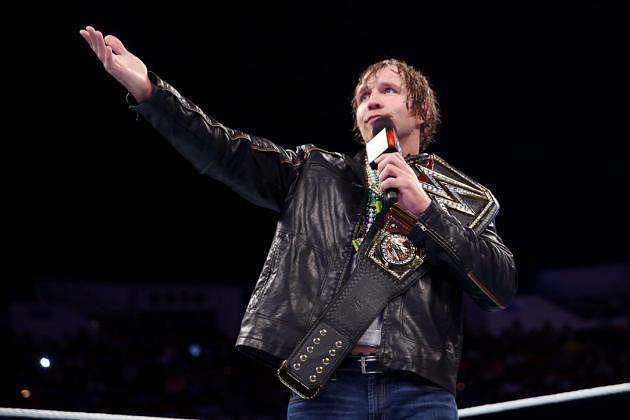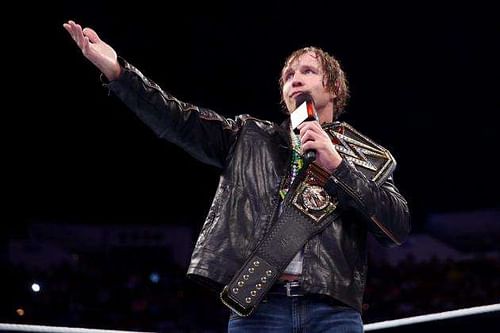
Top Rope Report: Time for WWE to ditch the promo segments
There he was. Dean Ambrose, one of the WWE’s top performers on the microphone, delivering a monologue promo in the ring on Monday Night RAW. And he wasn’t all that entertaining.
Sure, Ambrose made it through and looked as comfortable as anyone, but there just wasn’t much there. Even though Ambrose was in the ring to talk about his huge matchup with World Heavyweight Champion Triple H at Roadblock on Saturday, the promo lacked any real substance, anything to make it memorable or add to the excitement of the match. It wasn’t until Triple H came out to banter with Ambrose that things got interesting.
And remember, this is one of the company’s better guys with the mic.
Others struggle
So it should come as no surprise that when someone like Roman Reigns, who doesn’t seem comfortable at all in a monologue, struggles to put together five or six minutes of compelling promo work. That’s been the biggest criticism of Reigns during his push to the top of the company, but really, who is actually good at those segments?
Bray Wyatt is usually very compelling with the monologues, but he has the benefit of a character who is completely unleashed from a content perspective. He can say, essentially, whatever he wants, and then make it fit into his maniacal cult leader persona. Others don’t have that luxury, so their solo speaking segments leave a lot to be desired.
Even the Authority – which includes people like Triple H and Vince McMahon, who have been doing this for 20 years or more – deliver boring, bland speeches more often than not. And when their in-ring soliloquies are good, it’s always when they’re announcing something or otherwise driving the action, which isn’t a benefit other performers share – Ambrose can’t announce that someone is fired or add a match stipulation. It’s never because the speech itself is that memorable or exciting.
Attitude Era is no more
For detractors of performers like Reigns, the easy knock would be that his cousin, The Rock, was able to be very engaging and entertaining by himself with a microphone and the crowd, but he had a distinct advantage. The same is true of another pure legend of the promo, Stone Cold Steve Austin.
They got to work in the Attitude Era.
In that no-holds-barred creative period in the late 1990s and early 2000s, there were very few rules as to what those guys could say on television, as long as they were entertaining. The Rock could speak in thinly veiled euphemisms about the female anatomy, while Austin could use nearly every swear word in the book, and the WWE’s adult demographic, the ones who criticize the likes of Reigns, ate that stuff right up.
The modern guys don’t have that luxury. Instead, they’re operating with a kid-friendly vocabulary, for the most part, but are expected to create believable tension while also entertaining adults. And that’s all on top of whatever specific scripting is being done behind the scenes.
The solution
So how can the WWE fix this problem before it’s too late for guys like Reigns and others who get bashed for their mic work?
It’s time to get rid of the in-ring promo segment.
Now, this is not to say the microphones should be completely eliminated because that would be ridiculous. Backstage interviews, dialogue between wrestlers after a match or other action and trash talk following a victory or leading into a match are all necessary parts of the business and can really drive the story. But the segments that open with a wrestler coming down to the ring to talk by himself have to go.
For one, they’re illogical. If these guys are in the back preparing for matches, what would compel them to just walk out to the ring and talk for eight minutes? And are these supposed to be spontaneous? If so, how does the guy controlling the music know when to hit the theme song?
For another thing, they’re relatively new. Before the NWO and Attitude eras, you didn’t see wrestlers coming down to the ring just to chat, and even then, it was usually a group or a guy looking to make something happen – calling out another wrestler, for example. Yet now, we’re to a point where this week’s Smackdown has already had two talking segments advertised without any mention of in-ring action.
Replace those segments with dialogue backstage, a clearly arranged interview of sorts or save talking for before and after matches. While Ryback’s promo with Kalisto on Monday was awkward, it was at least tolerable because it had a purpose and made sense. And if the promo can’t help advance the story in any way, replace it with a match because there are plenty of WWE Superstars who aren’t getting enough work in the ring.
The alternative is what we saw with Ambrose. There was a man who has an actual gift of gab left in the ring alone to tell a story we had already heard about a match most of us assume we know the ending to. It was boring, it was forced and, perhaps worst of all, it wasn’t necessary.
